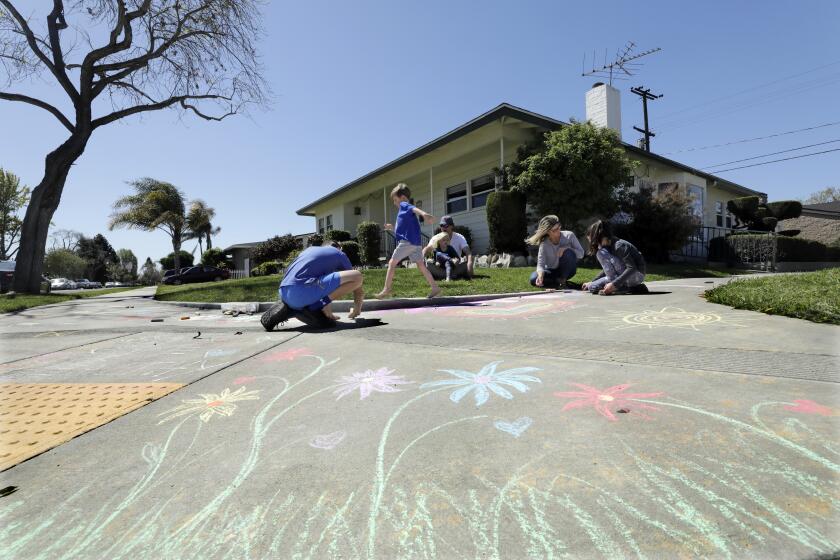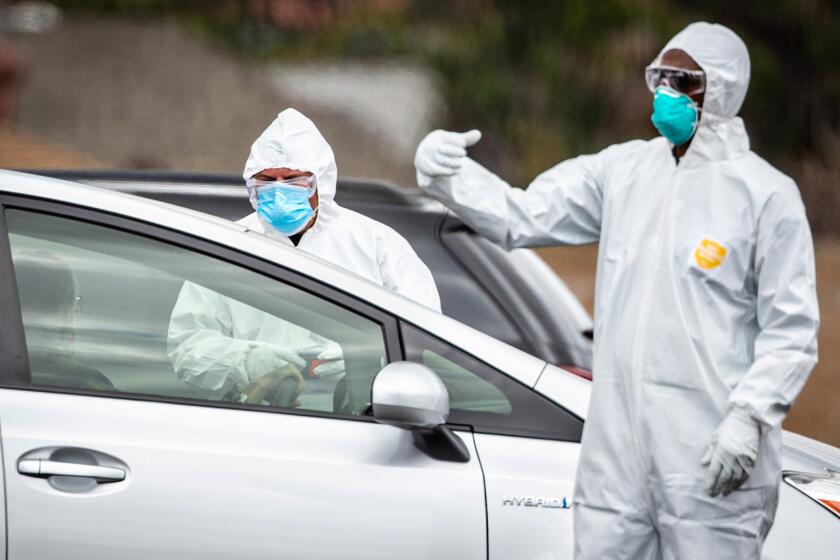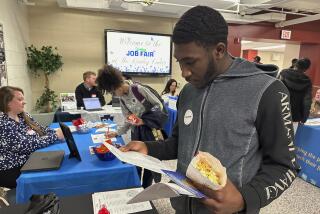Column: The coronavirus has already flattened one thing — the line between work and family
- Share via
Remember BBC Dad? You know, Robert E. Kelly, that poli-sci professor in South Korea who in 2017 was being interviewed remotely about the impeachment of then-South Korean President Park Geun-hye when his adorable 4-year-old daughter marched into his office with her baby brother hilariously rolling behind her?
Remember how stricken their mother, Jung-a Kim, looked as she dashed in to haul them out? Remember how the video dominated news cycles for days, briefly sparking conversations about balancing work and family? Nevertheless, since in this country conversations about the difficulty of balancing work and family are ongoing and thus far fairly fruitless, BBC Dad was seen by most as a blooper supreme that made everyone on the planet laugh.
No one’s laughing now. In the universal coronavirus-mandated stay-at-home office, you’re lucky if one of the 12 co-workers on your Zoom meeting gives you the heads-up before your own 4-year-old empties the fishbowl onto the floor behind you.
Nowadays, every interview, Skype session and conference call is prefaced by the parental warnings — participants listing the number and ages of the children who are currently supposed to be doing schoolwork/watching TV/napping/being amused by another family member but, realistically, could interrupt at any moment. Just so everyone’s aware.
Those of us fortunate to remain well during the COVID-19 pandemic have learned many new things about people we thought we already knew pretty well. Like, we are all stress-baking way too much. And refusing to acknowledge that no matter how young you are, overhead lighting is not your friend. (Seriously. I cannot stress the benefits of indirect lighting enough.)
Those of us fortunate to remain employed in ways that require regular tele-contact have learned other things as well. Longtime co-workers are suddenly revealed to have a wide range of pets, for example, or an alarming number of snake plants; others have, shall we say, unexpected taste in art or a nearly endless collection of hooded sweatshirts (okay, that’s me — but honestly, you all should have known).
Most important, it has also been revealed that many of us have children. Children who are not, as it turns out, theoretical or compartmentalizable. Children who exist as actual humans, outside the confines of adorable pictures — and are capable of disrupting work in ways far less manageable than the occasional request to leave early so as not to miss a parent/teacher conference.
With schools across California closed, millions of parents have become de facto teachers and principals. “It’s bonkers,” says one mom.
Here they are, these children, now banned from daycare, school and college, suddenly — and no doubt to some, shockingly — displaying measurable physical dimensions, and immeasurable physical needs, including a near-constant desire to be fed while showing you a really funny TikTok right now. Children, even the older ones, who need to express their frustration, especially now, in a highly unscheduled way. Children who just want show you the latest missive from their university and demand that you promise college will resume in the fall. Or tell you the dog got out again and should they get him? Or show you this very cool ginormous bug they just found, only wait ... it was right there a second ago, where did it go?
Children who need to do all of these things and more even and especially if their mother or father is currently in a Zoom meeting.
Suddenly the BBC Dad video seems less like a blooper and more like an unexpected tear in the Potemkin village we have built at the border of work and family. You know, the one that “proves” everything is just fine — nothing to see here, parents are perfectly capable of juggling two full-time jobs on their own! — so American businesses can pretend that there is no need for things like on-site daycare, flex time, telecommuting or extended parental leave. You know, the kinds of resources that virtually every other first-world nation has had for decades?
“I’m really hoping that one of the silver linings of this thing is that we can all stop apologizing for having families,” a television producer and mother said to me recently. “I can’t tell you the number of times I’ve had to apologize for being interrupted even though I was working at night or on a weekend.”
BBC Dad, if you remember, was mortified by his children’s on-camera incursion, and feared it would end his career as a go-to expert on South Korea. Instead, it had the opposite effect — he got even more on-camera gigs the following year and no one seemed to think he had less insight into that country’s politics because he also had young children.
From a reporter with COVID-19: No matter how you feel, act as if you have the coronavirus. You just might.
Kim took it on the chin for a bit, however. Many people immediately assumed — because Kelly is white and Kim is Asian — that she must be the nanny, while others were concerned at how panicked she looked as she attempted to corral her children. Concerned, it must be added, that she was personally being mistreated in some way, not that social pressures to keep work and family separated could, and do, create such palpable panic.
In fact, it was the look on Kim’s face, rather than Kelly’s ability to remain calm that spoke to many, in a fairly unfunny way. Working mothers, and to an increasing extent working fathers, know that panic all too well — somehow one of the 85 balls in the air has fallen and everyone will now see that we are incapable of doing the impossible.
When my younger daughter was just 3, I had to interview a very famous celebrity on a Sunday morning because that was the only time he could talk to me. So I locked myself in my bedroom. And when my daughter started pounding on the door, completely ignoring her father and yelling for me, I wedged myself under my bed in the hope that the mattress would act as soundproofing. It didn’t. “What the hell is wrong with that kid?” the (then-childless) celebrity growled, only partly in jest.
“Nothing is wrong with that kid,” I should have said. “She is 3 and it is Sunday morning and she wants her mother. Like 3-year-olds do on a Sunday morning. You work in theater, you must be used to tantrums. Carry on.”
Instead I apologized, profusely, and wiggled further under the bed.
Now, any business that is able to remain open is also open to doing business any way it can be done, mostly from home. Homes that are shared by children, who are dealing with their own sequestration side effects and cannot reasonably be expected to pretend that mom is at her office when clearly she is in her bedroom, wearing a nice top over sweatpants and fiddling with the lamp so she doesn’t look 108 years old.
A mom like that might very well need a snack during her “meeting” — and that snack might very well consist of Lucky Charms that then spill all over the bed, and how is that the Lucky Charms-proffering child’s fault? He was just trying to be nice.
And you know what? He was trying to be nice. And there is no reason, mid-pandemic or not, why business cannot be conducted while a person also mops up the fallout of a very large bowl of Lucky Charms. Or takes a minute to tell her college student daughter, now stuck at home, where the cheese grater is kept. (The same daughter who has a big sign on her door announcing the hours she is in Zoom class because, while it may be OK for a young-adult child to interrupt an interview with a question asked in hand gestures, the thought of her classmates getting the merest glimpse of an inquiring parent is too ghastly to contemplate.)
It is OK for two things to be occurring at once because for working parents, at least two things are always occurring at once. The boss may not know it, but Mom has been doing this balancing act for years. Whether silently making a grocery list while Simpson from HR drones on in some required meeting or correcting homework during an 8 p.m. conference call, working parents have functioned this way for decades.
The only difference is that now, everyone is seeing it live-streamed.
So maybe, once this pandemic has passed and we emerge from isolation, we can all remember what we have learned: that being at work doesn’t mean you temporarily don’t have a family any more than being at home means that when you are there you never do any work. That workers need things like flex time, extended leave and subsidized family care.
And if those resources are not going to be provided, well, businesses will just have to deal with the interruptions. Certainly this crisis has put our previous definitions of “interruption” in perspective — when a fear of illness and potential death is what’s keeping you from your place of work, ducking out of a Facetime conversation because your kid needs you to proofread an essay due at noon, which is five minutes from now, just doesn’t seem like that big of a deal.
Because it isn’t.
More to Read
The biggest entertainment stories
Get our big stories about Hollywood, film, television, music, arts, culture and more right in your inbox as soon as they publish.
You may occasionally receive promotional content from the Los Angeles Times.













